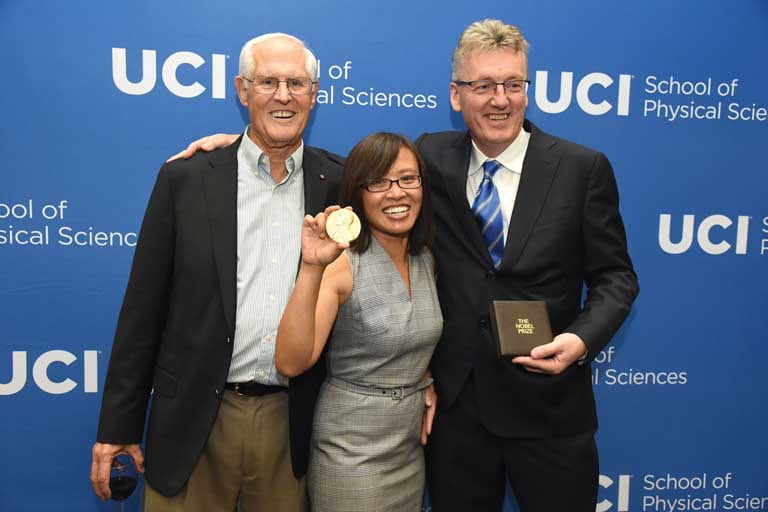Tools for living
In a society dominated by science and technology, UCI humanists are revitalizing our ability to think creatively, write persuasively and value other cultures
Paradox prevails in the humanities today. By many accounts, the value of a humanities education is waning in the eyes of parents and students, who look practically at a college degree as a passport to employment. On the other hand, a study by two small liberal arts colleges found the nation’s CEOs, focusing on the long-term, calling the humanities essential to “critical thinking, problem-solving and flexibility.” To them a “practical” education instills the capacity to keep on learning throughout a career certain to change.
Even in academia, contradiction continues. While the lion’s share of prizes, public attention and funding goes to the sciences and technology, the UCI School of Humanities has become one of the highest-ranked schools in the country.
One reason is that relevance is not a cliché to UCI humanists. They have always asked – and continue to ask – how the humanities can remain vital in a changing world. Their answer is to embrace change within a society that rallies around science, computer technology, and getting an education to get a job. All of which, paradoxically, make the humanities more important than ever.
Under the umbrella of the humanities are disciplines informing every area of human endeavor. At UCI they encompass language and literature, classics, history and art history, philosophy, film studies, and affiliated interdisciplinary programs in African American, Asian American, Latin American, religious and women’s studies.
The humanities are important for many reasons, says humanities dean Karen Lawrence. “They provide what Kenneth Burke called ‘equipment for living.’ And humanities research is a laboratory for new thought, where the unpredictable enters and where larger implications for civilization emerge. The humanities’ traditional mission, moreover, remains indispensable – to make sure graduates can read and think critically, write with reason and persuasion, and comprehend the value of cultures other than their own.”
Doesn’t that happen in other disciplines? To an extent, but as author and Graduate School of Management lecturer Judy Rosener relates, “Our students are very bright, but I’m constantly harping on the difference between description and analysis.” Rosener’s students read Machiavelli’s “The Prince” and a contemporary text, then discuss how the two relate to ethics in business. “There are no right answers; they just have to support their answers,” she says. “Often that’s an idea they haven’t met before. But it’s that kind of critical thinking employers want to see, and it’s what you get in the humanities.”
This intensive engagement with literacy is the hallmark of a humanities education. At UCI, one place to experience that engagement is the Humanities Core Course, a pioneering concept when introduced in 1970, and one that has gained acclaim and popularity with time. About 1,000 students take the core course each year; it’s required for all humanities majors, and so respected campuswide that 75 percent of enrolled students come from majors outside the humanities. They finish dazed but convinced they have made the passage from high school to university – from simply absorbing information to evaluating its significance and authority.
While loyal to the basic mission of critical literacy, the humanities at UCI are undergoing calculated changes, both within the school and in the school’s relationship with the community.
Humanities faculty like history professor and associate dean for undergraduate studies Bob Moeller, for instance, are honing their approach to communicating in the classroom. He has made his courses, syllabi and assignments electronically available to anyone on campus. In the classroom, Moeller stands facing students, types a website address into the computer … and bingo. His European history web page appears on a projection screen. He can click on links ranging from a timeline of the Holocaust, to an 18th-century poster of a French woman and child for discussing how dress symbolized class in society.
Other faculty may opt to hold classes in the Humanities Instructional Resource Center, where students sit one-to-a-computer in circled groups, allowing instructor and students to edit papers together or share visuals from the Internet or CD-ROM. “We have to realize that students are at home with this technology; they grew up with it,” says Moeller.
Growing up with an interest in humanistic studies, however, is not so pervasive. The realization that many local children may be unprepared for a university education – much less a lifetime of learning – has led faculty to create an outreach program unique in Southern California. “Humanities out There” – HOT – has recently completed its first year in local K-12 schools. Its success is built on a combination of faculty lectures with tutoring by UCI graduate and undergraduate students in the kind of reading, thinking and writing children will encounter in college. The program focuses on students in Santa Ana who are struggling against the barriers of poverty and cultural isolation, says HOT director Julia Lupton, associate professor of English and comparative literature. “We tell them, ‘If you get your act together, this is what you’ll be doing at a university in a few years.'”
Their vehicle is world mythology, like Hercules and the Ancient Ballad of Mulan, which predates the Disney version of the Chinese heroine by about 15 centuries.
“Mythology works for everyone,” says Lupton. “Myths are great stories, encompassing cultural heritages from East and West in an engaging way. Mythology also exposes them to creative, high-level thought. The stuff that makes students’ brains hurt is also what is most exciting to them.”
More complicated to address is the gap in appreciating the humanities that extends beyond the younger generation to a society that spends more on Super Bowl advertising than the National Endowment for the Humanities spends in a year on research. To the general public, the humanities are ivory tower preoccupations – nice, but not equated with real-world skills. This attitude is the biggest danger facing the humanities, says professor of German and UCI Humanities Center director John Smith. “If we can’t explain our research and our role in education like the sciences do, then the public will say we need to teach students to read and write and that’s all.”
Unwilling to accept that fate, UCI humanists are finding new ways to share the vision and tools of the humanities with the community. Soon after coming to UCI in January from the University of Utah,
Lawrence created the Dean’s Advisory Council. The council and the Humanities Associates are the major support groups helping to raise funds, begin an internship program and generally make the humanities at UCI more accessible to the public. The council sponsors events like the upcoming community forum on business titled, “Ethics in the Workplace.” To spark enthusiasm for the “intellectual pleasures” coming from the humanities, the council is arranging “salons” where members hear faculty speak on topics from James Joyce to world citizenship.
Support group activities also contribute to the school’s fundraising goals, which include additional funds for scholarships and the HOT program, $1.5 million for endowed chairs and $60,000 for the UCI Humanities Center.
Formed last year, the center is an intellectual intersection for campus and community. It grew out of the UC Systemwide Humanities Initiative, which established the UC Humanities Research Institute based at UCI, as well as humanities centers at all nine UC campuses. In addition to funding faculty and student research, the UCI Humanities Center is forging community links through lectures and conferences such as the ethics forum planned for March 1999.
Last spring, the center invited scholars to discuss “Foreign Language in the New Humanities.” They focused on revitalizing language study, not only as preparation in the basic skills, but also as an immersion in culture. “Students will go beyond reading literature,” explains center director Smith, “to better understanding high and low culture and how people think in that culture, an aptitude business leaders tell us is essential in today’s global environment.”
Involving students in the local work environment is another of the school’s outreach goals. Dean’s Council member Jon Wampler, an executive consultant with PacifiCare health maintenance organization, is heading the effort to have students working in business, government and cultural organizations by fall 1999.
“Rarely do humanities students get exposure to the business world before graduating, and that’s a shame,” says Wampler. “Employers are looking for people who can think, present ideas and work on a team. Internships give students a taste of what to expect and an edge in getting a full-time job.”
According to Gar Cropser, UCI career counselor for arts and humanities, when it comes to the job market, “a humanities degree is both a blessing and a curse.” Graduates have the portable intellectual skills many employers want. But unlike the “techie” who graduates with multiple job offers, the humanities grad has to work to find work: Eighty percent of the jobs are landed through networking and hearsay.
Today’s job market, however, is the best in years for undergraduates. According to the National Association of Colleges and Employers, average salary offers for 1998 humanities graduates with bachelor’s degrees are hovering around $25,000 to $30,000, with some as high as $40,000.
Cropser admits he doesn’t have the answers for graduate students. Nationally, the scene has been dismal for a long time. Fewer than half this year’s humanities doctoral graduates will find tenure track or even good full-time teaching jobs.
“UCI has a better-than-average placement rate because of its reputation,” Dean Lawrence says. “But it’s time to start thinking about alternative berths in the economy for these extremely bright and accomplished people.”
She adds, “These are tough times for the humanities,” even though she sees the trend edging in the other direction. “UCI has fared better than most humanities schools because it has always made space for innovation,” and Lawrence plans to preserve that spirit in future programs and faculty recruitment.
The impact that UCI’s School of Humanities wields today is a direct result of the bold, strategic hiring of senior faculty early on, Lawrence explains. They shaped an intellectual atmosphere at UCI which didn’t try to duplicate other campuses. It was the emphasis on theory throughout the disciplines, critical theory in particular, that gave the school an international reputation and top 10 rankings for graduate programs in French, creative writing, comparative literature and critical theory.
UCI lost a number of key faculty, however, due to budget cuts and early retirement incentives of the early 1990s. “The humanities were hit hard, but we are recovering gradually,” says Lawrence. She plans to continue recruiting top senior and junior faculty, as well as internationally known scholars and writers to fill endowed chairs. “Now is also the time to be mining the cross-disciplinary connection in our programs,” she adds. New possibilities abound in ethnic and women’s studies, for instance, and in film studies where a newly approved doctoral program in visual studies is one of only two in the country.
And as the dean glances out the window of her office in the Humanities Instructional Building, she confesses a longing for one more change. “Isn’t it ironic that our brand new building has such a flatfooted name. It cries out for the signature of a willing benefactor of some endowed chairs or lectureships-something that reflects the vitality of the humanities at a research university.”
Utilitarian building name aside, the kind of reexamining going on at the school – from language study and outreach, to career options and the role of technology – is typical of the humanities and its inherent paradox: while humanists preserve culture, they also find new ways of criticizing its content and meaning. While they prepare the mind for appreciating the “intellectual pleasures,” they also equip it to analyze a political agenda or pluck the kernels of truth from a vast field of knowledge.

